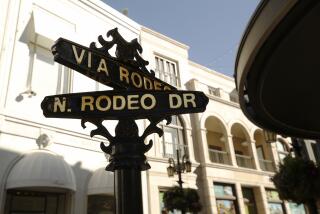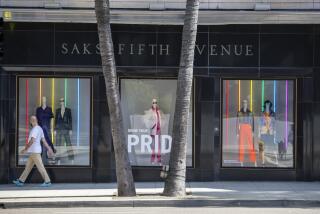Dunhill Tries to Clear the Air Over Image
James Frain, president of that bastion of Britishness, Alfred Dunhill of London Inc., summed up the situation with admirable exactness. The old Dunhill shop, just a few doors south of the Beverly Wilshire on Rodeo Drive, had been on the Wrong Side of Wilshire, where “it’s like no man’s land. Not many people get across the street (Wilshire Boulevard). If you’re really serious, you have to be on the north end of Rodeo.”
Dunhill has never been known for a sense of humor. For 80 years, one has gone to Dunhill for the serious pleasures: namely, a good smoke. And even now amidst the boxes and packing crates that clutter the new store at One Rodeo Drive prior to its opening Saturday, headless mannequins already suited and accessorized from Dunhill’s off-the-peg line of menswear, there is the sense of coming home. Home to a world where the traditional values still exist: courtesy, conversation and a good cigar.
Although the new store is a prime showcase for Dunhill’s extensive menswear line--indeed, Dunhill ties, slacks, classically tailored jackets are displayed almost like sculptures, encased in fine cherrywood bins and racks--the fact remains that the Humidor Room was the first part of the new store to be completed. The Cuban cedar cabinetry, no longer available in today’s political climate, has been moved from the old Beverly Hills store and the cigars successfully transferred.
It is here that store manager Bruce Blomquist and Keeper of the Humidor Roy Townend, both temporarily removed of the black blazer and grey slacks that are the Dunhill uniform and clad in jeans and workshirts, bring visitors. And it is here that the clubbiness of Dunhill tradition is most pronounced, the heady cigar aroma mixed with the tart freshness of cedar, the rows of bins labeled in bronze with the names of some of Beverly Hills’ great cigar smokers: Milton Berle, George Segal, Sidney Omarr, Richard Widmark, George Peppard and the new breed, such as Dirk Benedict, stockbroker Alan Rifkind, Crown International Pictures head Mark Tenser.
Nevertheless, Frain and Blomquist are quick to establish, there is more to Dunhill. The preferred image is that of quality or, as Alfred Dunhill put it so many years ago, “It must be useful. It must work dependably. It must be beautiful. It must last. It must be the best of its kind.”
Hence, the Dunhill man is, according to Frain, “someone at that point of life where they don’t think of jumping around; they’ve established a style which they know is right for them. They understand the difference in quality between a $300 suit and one that costs $900.” The Dunhill man may or may not be a cigar smoker. (But since one must walk the length of the selling space with its assorted temptations to get to the Humidor Room, it would be hard for a cigar smoker not to be a Dunhill man.)
However, Dunhill is not just another store with expensive, quality suits. Definitely not another Bijan, Frain says.
With the new line of suits, for instance, there are three options: custom, special order and off-the-peg. The custom suit, which starts at $1,925, is sewn completely by hand. The off-the-peg suits, made in Italy by Zegna, begin at $900. Yet even with off-the-peg, buttons and functional buttonholes are installed after the suit is tried on. Basting stitches remain on the garment until it leaves the store.
The Beverly Hills store has its own master tailor, so it’s gotten an early jump on the Executive Sales Program, another innovation this year. This is for the man who hates to shop or is simply too busy. For this, the Dunhill people come to home or office, measure the customer and analyze the wardrobe needs. Then it’s only left to him to choose fabrics and styles.
There is some speculation that the new store (one of five across the United States to be similarly refurbished) and the expanded menswear line is an attempt to bring Dunhill into the 20th Century. Dunhill President Frain responds to this suggestion through a chuckle, “. . . hardly, I should think, since Dunhill was started in 1907.” Rather, he says, this new campaign is an effort to increase Dunhill’s presence in the United States, where the Dunhill image is “positive” but “unexposed,” accounting for less than 10% of Dunhill’s worldwide market. Japan is good for 40%.
More to Read
Inside the business of entertainment
The Wide Shot brings you news, analysis and insights on everything from streaming wars to production — and what it all means for the future.
You may occasionally receive promotional content from the Los Angeles Times.










